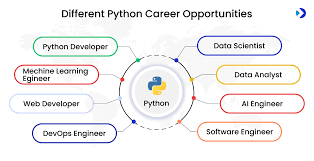Career Opportunities in Python Programming

Python, with its simplicity, versatility, and extensive libraries, has emerged as a dominant force in the programming world. This has opened up a plethora of career opportunities for those who master the language. Let’s explore some of the most promising career paths in Python programming.
1.Python Developer

This is the most direct career path for Python enthusiasts. As a Python developer, you will be responsible for writing, testing, and debugging code using Python. Your work can span across various domains including:
- Web Development: Building dynamic and interactive websites using frameworks like Django and Flask.
- Data Science: Handling and analyzing large datasets to extract valuable insights.
- Machine Learning: Developing intelligent systems that learn from data.
- Software Development: Creating standalone applications for various platforms.
2. Data Scientist
Python’s prowess in data manipulation and analysis has made it a preferred choice for data scientists. Your role will involve:
- Collecting and cleaning data.
- Exploring data to uncover patterns and trends.
- Building predictive models using machine learning algorithms.
- Communicating insights to stakeholders.
Python libraries like NumPy, Pandas, Matplotlib, and Scikit-learn are essential tools for data scientists.
3. Machine Learning Engineer
If you have a keen interest in artificial intelligence, a career as a machine learning engineer can be fulfilling. You will:
- Design and develop machine learning models.
- Train and optimize models for performance.
- Deploy models into production environments.
- Collaborate with data scientists and software engineers.
Frameworks like TensorFlow and PyTorch are commonly used in this field.
4. Data Analyst
Data analysts use Python to extract meaningful information from data. Your responsibilities will include:
- Data cleaning and preprocessing.
- Exploratory data analysis.
- Creating visualizations to communicate findings.
- Supporting decision-making with data-driven insights.
5. DevOps Engineer
Python’s scripting capabilities make it a valuable tool for DevOps engineers. You will:
- Automate infrastructure provisioning and management using tools like Ansible.
- Build and maintain continuous integration and continuous delivery (CI/CD) pipelines.
- Monitor system performance and troubleshoot issues.
5. Full-Stack Developer
While Python is primarily a back-end language, it can be used for full-stack development when combined with front-end technologies like JavaScript. As a full-stack developer, you will handle both server-side and client-side development.
6. Financial Analyst
Python’s numerical capabilities make it suitable for financial analysis. You can use it for:
- Risk modeling.
- Portfolio optimization.
- Algorithmic trading.
- Financial data analysis.
7. Cybersecurity Specialist
Python can also be used in cybersecurity due to its ability to automate tasks and scripts. As a cybersecurity specialist, you would use Python to automate security tasks and scripts, such as vulnerability scanning and penetration testing. You would work on various projects such as network security, application security, and cloud security. If you are looking for a career in cybersecurity you will need a strong understanding of cybersecurity principles, as well as proficiency in security tools and scripting languages.
Other Opportunities
Beyond these core roles, Python skills can be applied in various other domains:
- Game Development: Creating games using libraries like Pygame.
- Scientific Computing: Solving complex scientific problems using libraries like NumPy and SciPy.
- Automation: Automating tasks using Python scripts.
- Cybersecurity: Developing security tools and applications.
- Academic Research: Conducting research and analysis in various fields.
Building a Successful Python Career
To excel in a Python career, focus on the following:
- Strong Python Fundamentals: Master the core concepts and syntax.
- Domain-Specific Knowledge: Acquire expertise in your chosen field (e.g., data science, web development).
- Project Experience: Build a portfolio of projects to showcase your skills.
- Continuous Learning: Stay updated with the latest trends and technologies.
- Networking: Build connections with other Python professionals.
- Problem-Solving Skills: Develop a logical approach to problem-solving.
The Future of Python Careers
Python’s popularity and versatility ensure a bright future for Python professionals. As data-driven decision-making, automation, and artificial intelligence continue to grow, the demand for Python skills will only increase. By choosing a Python career, you position yourself at the forefront of technological advancements and open doors to a world of exciting opportunities.
Jobs in Python Programming: A Growing Field
Python, a versatile and high-level programming language, has seen a meteoric rise in popularity in recent years. This surge has directly translated into a significant increase in job opportunities across various industries. Let’s explore some of the most sought-after roles in Python programming:
Web Development
- Full-Stack Developer: Responsible for both front-end and back-end development using frameworks like Django and Flask.
- Web Developer: Focuses on back-end development, handling server-side logic and database interactions.
Data Science and Machine Learning
- Data Scientist: Analyzes and interprets large datasets to uncover valuable insights.
- Machine Learning Engineer: Develops and trains machine learning models for various applications.
- Data Analyst: Uses Python to clean, analyze, and visualize data.
DevOps
- DevOps Engineer: Bridges the gap between development and operations teams, automating infrastructure and deployment processes.
Automation and Scripting
- Automation Engineer: Creates scripts to automate repetitive tasks and improve efficiency.
Other Roles
- Financial Analyst: Uses Python for financial modeling, risk analysis, and portfolio management.
- Cybersecurity Analyst: Leverages Python for threat detection, vulnerability assessment, and incident response.
- Game Developer: Creates games using Python-based frameworks like Pygame.
- Scientific Researcher: Employs Python for data analysis, simulations, and scientific computing.
Job Market and Salary
The demand for Python professionals is consistently high, making it a lucrative career choice. Salaries vary depending on factors such as experience, location, and specific role. However, Python developers generally command competitive compensation.
Tips for Success
- Continuous Learning: Stay updated with the latest Python libraries, frameworks, and trends.
- Build a Strong Portfolio: Showcase your skills through personal projects or contributions to open-source projects.
- Network: Connect with other Python developers and professionals in your industry.
- Specialize: Consider specializing in a particular domain within Python programming to stand out.
In conclusion, Python’s versatility and growing popularity have created a wide range of job opportunities. By honing your Python skills and staying abreast of industry trends, you can embark on a fulfilling and rewarding career in this dynamic field.
